Supported Microphones
A high quality microphone designed for speech recognition is a critical component for optimal results with the Fusion Narrate application.
The Fusion Narrate client supports various categories of microphones: Handheld, Headsets, Tabletop, Built-in, and Mobile.
In summary, the handheld microphones are the top-recommended microphones since they deliver great speech recognition accuracy and allow for configurable buttons that integrate with the Fusion Narrate client.
A headset microphone with a long boom can also deliver great speech recognition results and is optimal for a hands-free environment. This category of microphones can deliver great accuracy since they are at the optimal distance from the user's mouth and as the user turns their head the microphone goes with. Additionally, headset microphones can do a better job at filtering out background noise. Unfortunately, not all headset microphones are created equal and many are not designed specifically for speech recognition. In general, Bluetooth technology delivers the lowest sound quality. DECT wireless technology is typically better followed by proprietary technologies designed specifically for optimal lossless speech quality.
Tabletop or gooseneck microphones are also a popular choice for a hands-free environment. These microphones will not deliver as accurate results as a handheld or headset microphone and they require a quiet environment such that background noise does not interfere. Microphone placement is important for good results. This style of microphone may be desired for a user who wants hands-free and does not want to wear a headset.
In a hands-free environment, voice commands can be used to control the Fusion Narrate application. However, for ease of use and to reduce the number of verbal commands, the combination of a foot pedal, hand control, or programmable mouse is recommended.
The following sections list the microphones specifically tested and supported for the Fusion Narrate client. Additionally, recommended microphones are noted for each category. There are easily over 1000 different types of microphones on the market, and though many microphones not listed will work with the Fusion Narrate application, accuracy may be degraded and technical support may not be able to assist with troubleshooting issues.
Handheld Microphones
These types of microphones are connected to the workstation via USB cable. They provide buttons to control the recording state in addition to other operations within the Fusion Narrate client. The action that each button performs can be assigned within the Fusion Narrate Microphone Button Settings configuration. NOTE: The nVoq.Voice client does not natively support any handheld microphone buttons and thus these microphones are not recommended for it.
It is not necessary to install any drivers or button mapping utilities from the microphone vendor for these microphones to work, since all necessary functionality is built into the client applications.
SpeechMike Premium Touch 3700 (Pushbutton) (SMP3700)
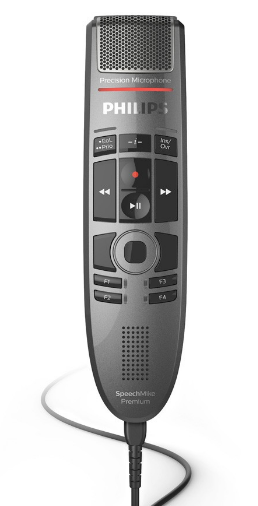
*** RECOMMENDED CHOICE ***
NOTES
- This model is newer than the 3500 model and has a touchpad instead of a trackball for mouse control.
- The SMP3800 is the same as this model, except with a built-in barcode scanner.
SpeechMike Premium Touch 3710 (Slideswitch) (SMP3710)
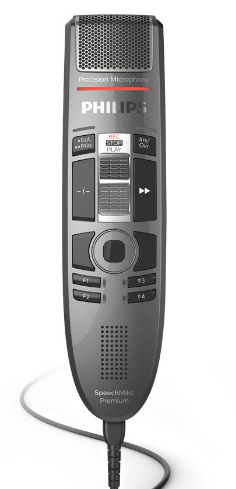
NOTES
- This model is newer than the 3510 and has a touchpad instead of a trackball for mouse control.
- The SMP3810 is the same as this model, except with a built-in barcode scanner.
SpeechMike Premium 3500 (Pushbutton) (LFH3500)
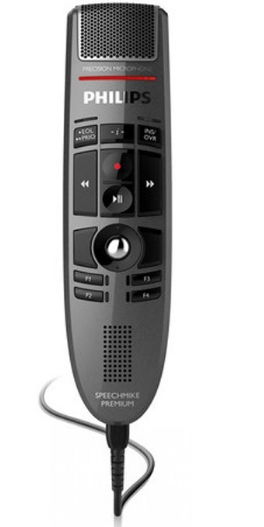
NOTES
- This model is older than the 3700/3800 series and has a trackball instead of a touchpad for mouse control.
- The LFH3600 is the same as this model, except with a built-in barcode scanner, but is no longer manufactured.
SpeechMike Premium 3510 (Slideswitch) (LFH3510)
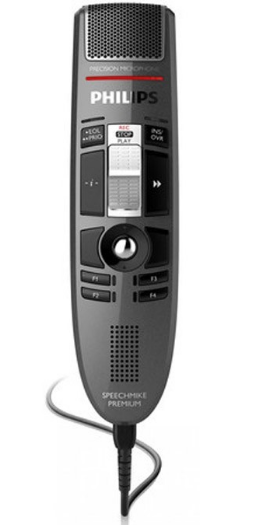
NOTES
- This model is older than the 3700/3800 series and has a trackball instead of a touchpad for mouse control.
- The LFH3610 is the same as this model except with a built-in barcode scanner, but is no longer manufactured.
ECS Gooseneck Mic Stand for Philips SpeechMikes
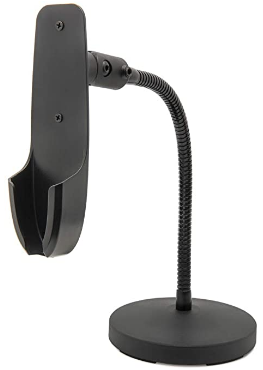
NOTES
- This is not a microphone. It is a 3rd party flexible add-on stand for holding a SpeechMike.
- SpeechMikes deliver the best results when held approximately 4 inches from the speaker's mouth. To use the SpeechMike for dictation and commands while on the stand, the stand must be placed close to the speaker.
Olympus® RecMic II RM-4010P (Pushbutton)
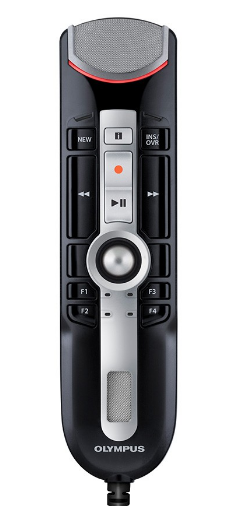
Olympus® RecMic II RM-4110S (Slideswitch)
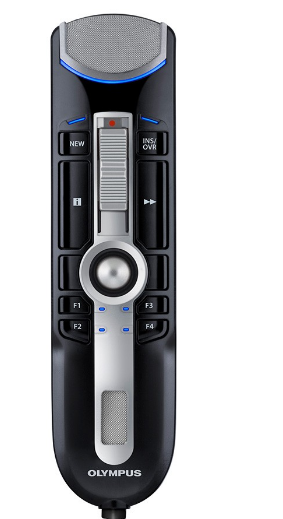
Olympus® RecMic II RM-4000P (Pushbutton)
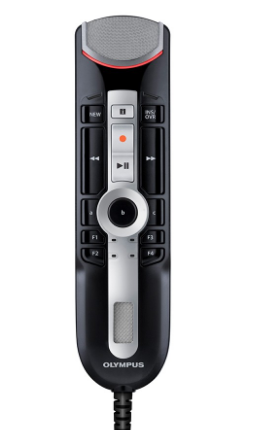
NOTES
- This model is similar to the RM-4010P. Instead of a mouse trackball, it has additional configurable buttons. Generally, users do not use the built-in mouse control on handheld microphones, so this is a good option for those who want optimal configurability.
Olympus® RecMic II RM-4015P (Pushbutton)
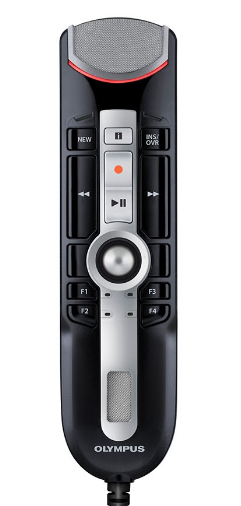
NOTES
- This model is the same as the RM-4010P, except it has a built-in flash drive for 8 GB of storage.
Nuance PowerMic 4 (0POWM4)
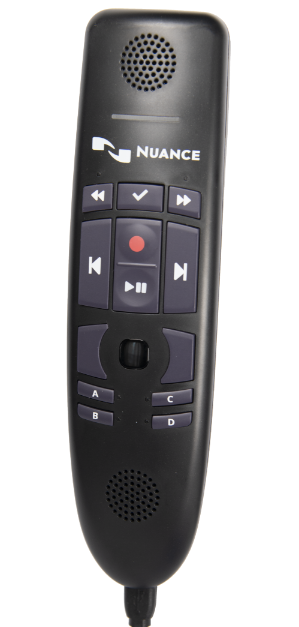
NOTES
- The rewind button is not functional at this time.
Nuance PowerMic III (0POWM3)
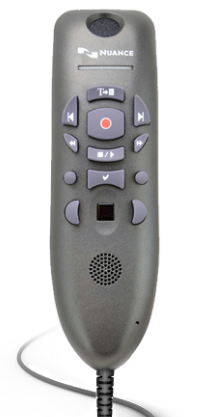
Nuance PowerMic II (0POWM2N)
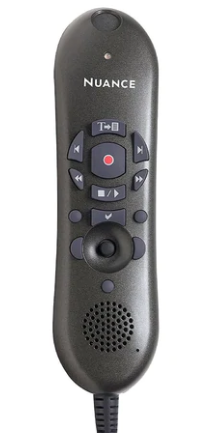
NOTES
- This is an older version of the PowerMic series.
- There is also a version (0POWM2S-005) of this microphone with a built-in barcode scanner.
Wireless Handhelds: Unless wireless is really needed, a USB cable connected handheld is recommended for optimal audio quality and to avoid any issues with battery or out of range issues.
SpeechMike Premium Air 4000 (Pushbutton) (SMP4000)
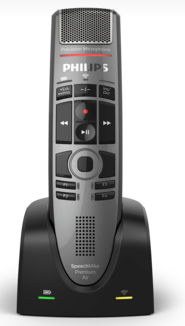
NOTES
- Pictured with required base station.
- Uses patented lossless audio transmission technology.
- Can also be paired with a second computer via the add-on AirBridge Wireless Adapter ACC4100.
SpeechMike Premium Air 4010 (Slideswitch) (SMP4010)
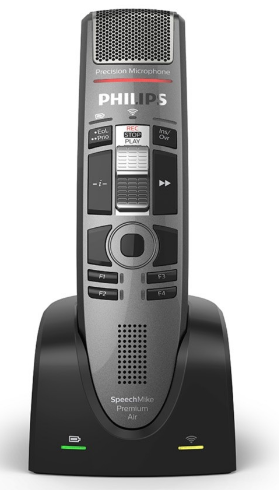
NOTES
- Pictured with required base station.
- Uses patented lossless audio transmission technology.
- Can also be paired with a second computer via the add-on AirBridge Wireless Adapter ACC4100.
Headsets (Wireless)
These types of microphones pair with a workstation, laptop, or tablet via Bluetooth or via some other wireless technology. There are many brands and models in the marketplace. It is important to find one that specifically states that it is designed for use with speech recognition. While wireless microphones are more ergonomic without the tether of a wire, they are susceptible to low battery and interference issues. In general, wired headsets are more reliable and cost less when compared to wireless headsets.
For complete hands-free it is recommended to pair these microphones with a foot pedal for optimal control.
Philips SpeechOne Wireless Dictation Headset (Slideswitch) (PSM6300)
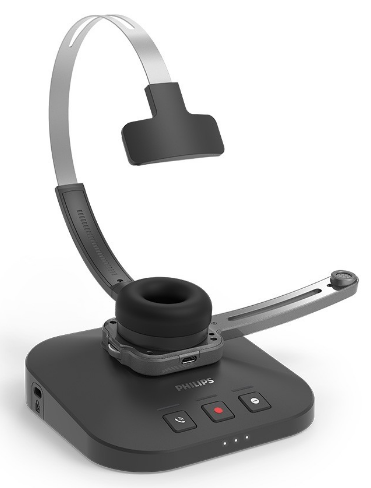
*** RECOMMENDED CHOICE ***
NOTES
- Proprietary wireless technology with great sound quality.
- Has a remote LED light but it is not used by the Fusion Narrate application.
- Has an add-on "remote" handheld SpeechMike-like device for configurable button control.
- Can also be paired with a second computer via the add-on AirBridge Wireless Adapter ACC4100.
- Talk time 12 hours.
- While this microphone is more expensive than most wireless headset microphones, it will deliver the best accuracy and thus the least number of edits.
Sennheiser XS Wireless 1 Headset System
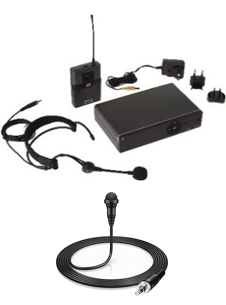
NOTES
- Proprietary wireless technology that delivers very high quality audio.
- Allows for exceptional range from the computer.
- Requires an add-on USB male to XLR female cable for connecting to the computer.
- The wireless transmitter takes 2 AA batteries which last about 10 hours of talk time, thus it is recommended to rotate out rechargeable AA batteries.
- The headset could be replaced with a Sennheiser Pro Audio ME 2-II lavaliere/lapel style microphone that could be attached to clothing or near the user.
EPOS | Sennheiser IMPACT DW Pro 1 or Pro 2
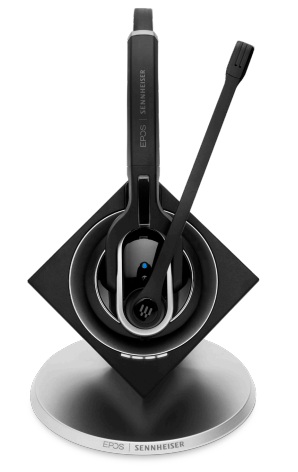
NOTES
- DECT wireless technology.
- Talk time 8 hours.
EPOS | Sennheiser IMPACT SD Pro 1 ML
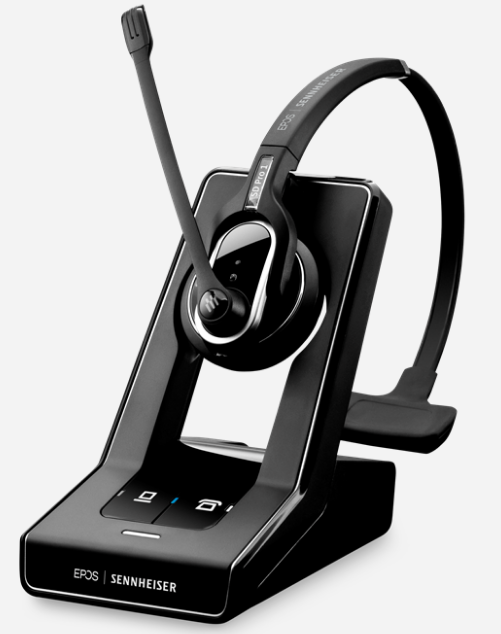
NOTES
- DECT wireless technology.
- Single sided headset.
- The IMPACT SD Pro 2 ML is a double-sided version of this headset and is also supported.
- Talk time 8 hours.
EPOS | Sennheiser IMPACT SDW 5000 series (5013, 5014, 5015, 5016)
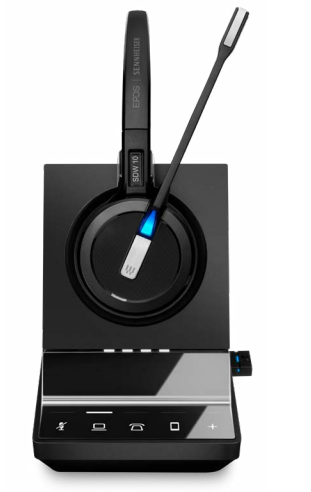
NOTES
- DECT wireless technology.
- Talk time 6-8 hours.
VXi VoxStar UC Bluetooth Headset System (VXi BT2 v1.0)
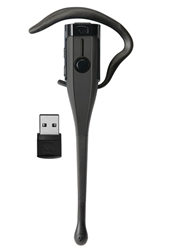
NOTES
- Bluetooth wireless technology.
- May no longer be available.
Nuance Dragon Bluetooth Headset
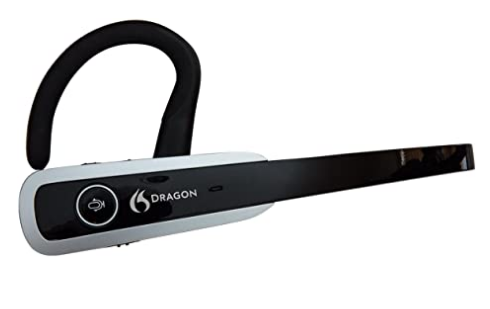
NOTES
- Bluetooth wireless technology.
- 10 hours talk time.
- May no longer be available.
Additional Important Information Regarding Wireless Headsets
Headsets (Wired)
These types of microphones connect to a workstation, laptop, or tablet using a wired connection. There are many brands and models in the marketplace. It is important to find one that specifically states that it is designed for use with speech recognition.
Andrea NC-185 USB Headset
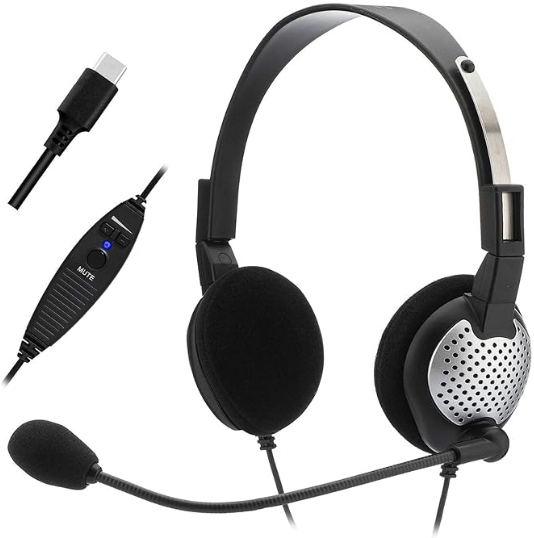
*** RECOMMENDED CHOICE ***
NOTES
- Wired with USB cable.
- Great playback and microphone sound quality.
SpeechWare FlexyMike Dual Ear Cardioid DEC
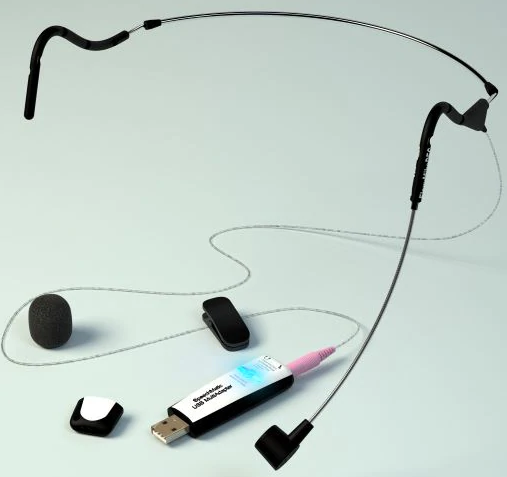
NOTES
- This is essentially a light-weight wired headset.
- The SpeechWare USB MultiAdaptor add-on is required!
TruVoice VoicePro 10/20/30/40 Premium Office Headset
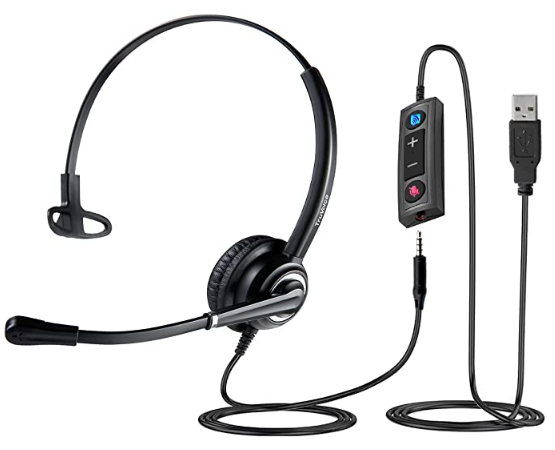
NOTES
- This is a wired microphone.
Tabletop and Other Microphones
Other USB microphones that do not have buttons can also be used with the Fusion Narrate client. Recording and shortcuts are initiated with voice commands, function keys, or foot pedals.
For complete hands-free it is recommended to pair these microphones with a foot pedal for optimal control.
An automatic recording gain boost has been added to the Fusion Narrate application for some models to improve the speed of tuning within the Microphone Setup and Tuning and to achieve good recognition results. Based on the operating system and the type of microphone, an additional recording gain boost may be configured in Windows® Control Panel - Sounds (if available).
SpeechWare 6-in-1 TableMike

*** RECOMMENDED CHOICE ***
NOTES
- There is also a 3-in-1 version that has a shorter and less flexible microphone gooseneck.
- There is also an option for an attached foot pedal, but this does not provide any benefit for use with the Fusion Narrate application.
- This tabletop microphone provides improved sound quality over the Sound Tech tabletop microphones and does not have to be as close to the speaker's mouth.
Sound Tech GN-USB-2 or GN-USB Gooseneck
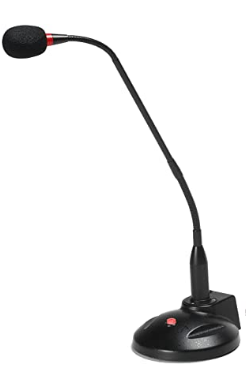
NOTES
- These microphones deliver good sound quality, but the microphone must be placed close to the speaker's mouth.
SpeechWare USB TravelMike
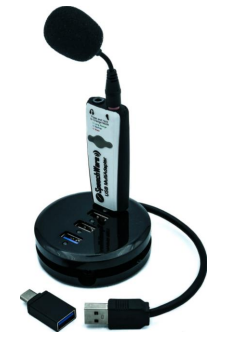
NOTES
- The second generation pictured to the left has a USB base/stand. The first generation only includes a 90 degree USB adaptor designed for connecting to a laptop USB port.
- This microphone has good range and is a good candidate for attaching to a monitor or other device such as a microscope using a USB-A extension cable and some Velcro or tape.
Blue Yeti Nano USB Microphone from Logitech
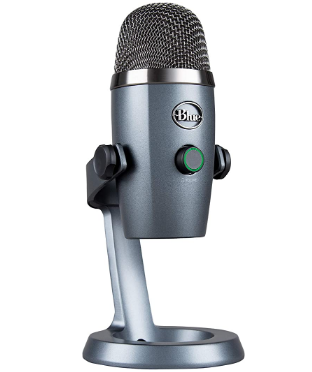
NOTES
- This microphone has good range, meaning it does not have to be close to the speaker. However, background noise, especially voices, will impact accuracy.
- For best results, it is recommended to set the directional button on the back of the microphone to cardioid.
MAONO AU-410 USB Lavalier
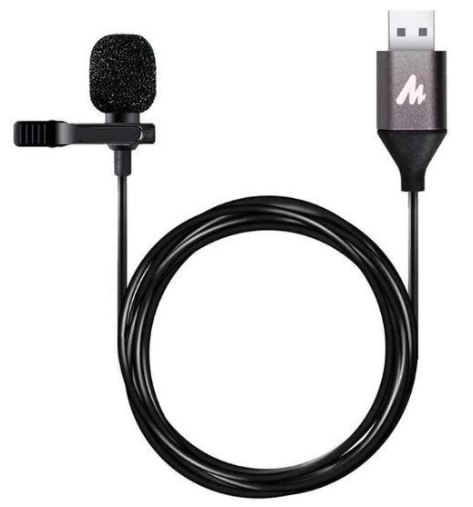
NOTES
- This is a wired microphone with a 6 to 7 foot USB cable.
- This is a lapel microphone, but is also ideal for attaching / clipping to a location near the dictator. It needs to be within 18 inches for good recognition, but the close the better.
- Background noise, especially voices, will impact accuracy.
Built-in Device Microphones
Some devices such as tablets, laptops, and webcams have integrated microphones. Generally, these types of microphones do not have effective noise cancelation features to meet the demands of speech recognition. The Fusion Narrate client can be used with these types of microphones, but results may vary.
Mobile Microphone (iOS and Android application)
This is an app that runs on iOS and Android devices called the Wireless Microphone. This app is specifically designed to integrate with the Fusion Narrate client. It allows one to use this device as a microphone instead of purchasing and connecting a dedicated microphone device. The mobile microphones will not recognize text as quickly as the other microphone types. The Wireless Microphone requires iOS 13.1 and higher or Android 9 and higher.